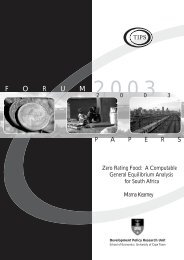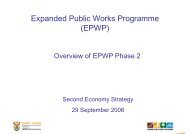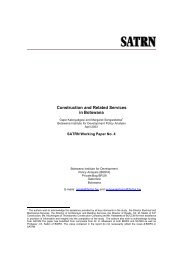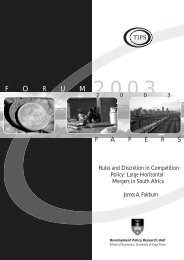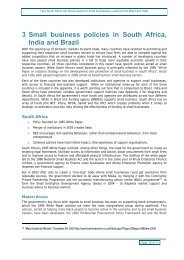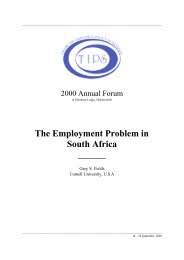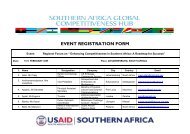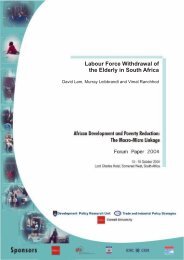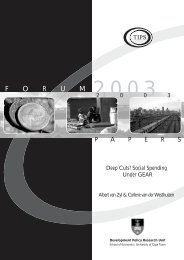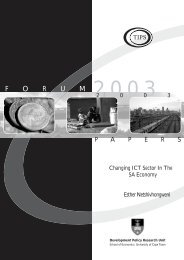(AsgiSA) Annual Report 2008 - South African Government Information
(AsgiSA) Annual Report 2008 - South African Government Information
(AsgiSA) Annual Report 2008 - South African Government Information
You also want an ePaper? Increase the reach of your titles
YUMPU automatically turns print PDFs into web optimized ePapers that Google loves.
Accelerated and Shared Growth Initiative for <strong>South</strong> Africa<br />
ANNUAL REPORT<br />
<strong>2008</strong><br />
Vulindlela analyses were also conducted in the departments of minerals and energy and of agriculture<br />
and in provincial economic departments. Overall, the retention of key personnel (including ICT<br />
practitioners) was identified as a serious need in these departments. The shortage of professionals reemphasised<br />
the need for a remuneration dispensation that recognised the contribution of professionals<br />
in the Public Service.<br />
In January 2006, the Project Consolidate approach was incorporated and mainstreamed in the Five-Year<br />
Local <strong>Government</strong> Strategic Agenda (2006 to 2011). Since then, a particular focus has remained on the<br />
targeted Project Consolidate municipalities. By the end of <strong>2008</strong>, a total of 1 283 experts were deployed<br />
to 105 Project Consolidate municipalities since the launch in October 2004. A number of key partners,<br />
such as the Siyenza Manje initiative of the DBSA, have also played a valuable role in improving municipalities’<br />
capacity. The involvement of national- and provincial-sector departments in support of local<br />
governments has also improved, with more departments participating with the development of local<br />
government sector plans.<br />
The review of the EIA process is complete and revised regulations have been promulgated. The impact<br />
so far has seen a reduced number of EIA processes, faster EIA processes for activities with minimum impact,<br />
greater awareness of environmental consequences, improved governance systems and improved<br />
co-ordination between government departments.<br />
In February 2007, Cabinet approved that RIA be implemented in <strong>South</strong> Africa through a two-year<br />
pilot phase. RIA is a methodology for improving the quality of regulation by systematically reviewing<br />
the potential impacts of proposed legislation and regulations. It is aimed to assist government and<br />
regulators to assess the likely direct and indirect costs and benefits of proposed regulations to various<br />
stakeholders as well as to understand the wider systemic consequences of introducing new rules into<br />
the existing regulatory environment.<br />
A significant amount of work has been done in building the foundations for RIA in <strong>South</strong> Africa. These<br />
include scoping RIAs and capacity-building required to accelerate progress in the implementation of RIA<br />
over the short to medium term.<br />
Capacity-building initiatives include training workshops for senior and mid-level government officials<br />
that took place in September <strong>2008</strong>. The training aimed at providing tools to facilitate the implementation<br />
of an effective, efficient, integrated and equitable regulatory framework in <strong>South</strong> Africa while<br />
addressing the negative social, economic and environmental consequences associated with poor legislation.<br />
The insights gained will be incorporated to the framework that is being developed to guide the<br />
implementation of the RIA in <strong>South</strong> Africa.<br />
Notwithstanding the scale of work that has been achieved to date, progress in conducting pilots has<br />
been slow, largely due to capacity constraints in departments. This has affected both the quantity and<br />
the quality of the RIA pilots or assessments conducted to date.<br />
71



